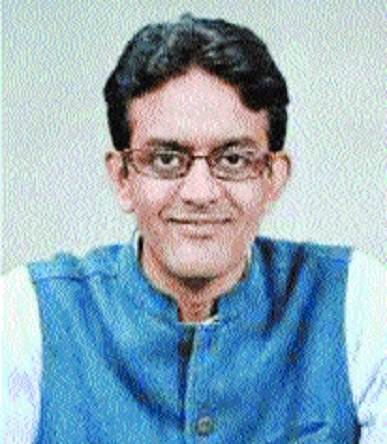Engaged in unmasking the untruth
| Date :18-Oct-2021 |

Vikram Sampath
By Vijay Phanshikar :
Historian he is -- by standard definition. Historian he is not -- by classic definition. Truth guides him, goads him to delve deep into facts of history -- beyond bias, beyond ideology. That his narrative assumes a strong and sharp nationalistic tone and tenor, is the outcome of his lifetime of dedicated effort to present truth -- and in the process unmask the untruth being dished out by politically-motivated lobbies. His effort, thus, has catapulted him to a leader-position among nationalist voices that are currently seeking to change the lop-sided and untruthful colouration of India’s history. Without Vikram Sampath, truthful presentation of history would have remained somewhat incomplete. For record, Vikram Sampath calls himself “Author & Historian”. Actually, however, he may be described as an intellectual explorer of the correct and authentic perspective of contemporary history. In a sophisticated mix of fine English and Hindi, he opens up. Ask him about his true inspiration and motivation, and Vikram Sampath’s sober face softens beyond imagination. “My parents. My Aaji -- maternal Grandmother”, he says in a voice dripping with softness, steeped in memory. Mother is his soft-point.
Three years ago, travelling in the car’s back seat, she just placed her head on his father’s shoulder and just passed away. That suddenness shocked Vikram out of wits. And at that “lowest point in life”, his first of the two-part biography of Swatantryaveer Vinayak Damodar Savarkar happened. Mother was one of Vikram’s true sources of strength. As the only child of a Tamilian father and Maharashtrian mother, he grew up in a home full of books and music and religious faith embellished by well-defined rituals that were never just formalities. Stories and anecdotes from history -- contemporary and ancient -- were an integral part of the sanskaar at home. Early education in an Aurobindo school, too, added special flavour to his understanding of what could be described as the signature of India and its culture. In the formative years, thus, Vikram developed a fine comprehension of what India was -- ancient but modern! Speaking and writing good language was an integral part of Vikram’s childhood education. He started essays with special flourish when he was just 10-11 years of age. And then came a turning point -- Sanjay Khan’s television serial on Tipu Sultan. “There, the royals of Mysore were very wrongfully portrayed. I could not stand that. I would just switch off the TV when that serial came on,” he says.
That proved to be a starting point of a lifetime of passion to find the correct story of India -- through episodic or personality studies. That gives Vikram Sampath a natural spot in public glare as he joins nationalist forces to unmask untruth that some lobbies are trying to weave around the iconic Swatantryaveer Savarkar. With consummate skill sharpened by unquestionable grip of facts, he demolishes the deliberately falsified narrative being pushed by Left-liberals and pseudo-intellectuals with a stated and unstated political agenda to malign India’s true image. There is little need to discuss Swatantryaveer Savarkar with Vikram Sampath in a relaxed conversation around a coffee table. The discussion is focused on his inspiration, his making that led him to shun a promising corporate career after graduation from BITS Pilani and accept the challenging path as a full- time author and historian. “Even as a Citibank executive, I spent a lot of time in research. Some may have called that madness, but I did not mind,” he says. What followed is now a famous career of a highly intellectual pursuit, in the process bringing to him an international acclaim. Vikram gets lost in his thoughts as he responds to questions about how he researches and writes. “Characters choose me. They appear into my thought-process as if by a divine design. I realise, I am just an instrument. Somebody else does the writing.
Things just happen”, he says with modesty that suits him so wonderfully. His work, thus, is a spiritual experience for Vikram Sampath. What acted most strongly was the parental spur. “My mother believed that aatmashakti -- power of soul or self -- makes all the difference”, he asserts. His Aaji’s spiritual practices, her faith in the divine carved Vikram’s personality differently. Encouraged by that sanskaar, he engaged himself in a serious spiritual pursuit, undertook certain ritualistic practices not blindly but with open eyes. Of course, he is an apparent success. But the enormity of the characters that he studies as a researcher often creates self-doubt in his mind. But then, that also keeps him alert and more focused on the task at hand. But even as he delves deep into a character or episode, he does not allow the emerging knowledge to influence his thought-process overly. He does have some opinions about some of Swatantryaveer Savarkar’s beliefs. “If he were alive, I would have had a debate with him on those,” he says. Such is his sense of independence. That has made his inquiry into history’s various facets unbiased. But nonchalance is not his way of doing things. He is emotionally involved in his subject. And that emotion shows up in the conversation that also makes eyes misty time and again. Certainly, the mark of a historian with a difference.